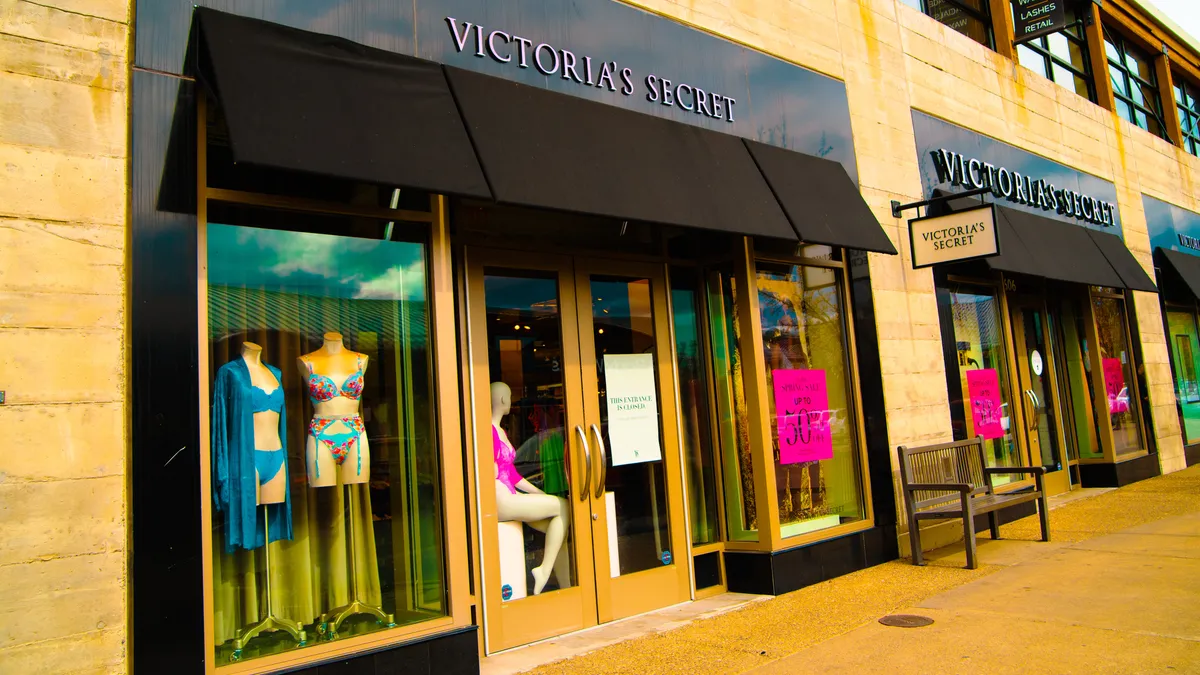Dive Brief:
-
Victoria’s Secret on Tuesday reported Q1 net sales fell 4.5% to $1.5 billion, coming in at the high-end of its guidance and beating analysts’ expectations. Taking out the effect of last year’s federal pandemic relief, which the company estimates led to some $75 million in revenue, net sales were essentially flat year over year.
-
Total comps, including e-commerce, were down 8%, but store-only comps were down 3%, according to a company press release. Inventories were up 37%, mostly due to longer transit times as ocean freight resumes, higher cost of goods due to inflation and merchandising decisions, per an earnings commentary.
-
Net income fell 53.6% to $80.8 million. Gross margin shrank by 660 basis points to 36.6%, due to about $80 million in supply chain costs and compared to higher-margin sales thanks to last year’s stimulus.
Dive Insight:
Despite a challenging quarter for apparel retailers largely shaped by outside forces, Victoria's Secret sounds firmly in control.
Speaking to analysts Wednesday morning, CEO Martin Waters cited NPD Group data showing that the retailer is recapturing sales that it had been losing to rivals.
"We're in the merchandise business, so our results are fundamentally based on how good we are at generating new products that resonate well with the consumer, and I think we have done a very good job in the category that's most important to us, and that is bras," he said. "We have arrested the decline in market share and actually built market share."
The retailer is accomplishing that in a wide variety of ways, including selling select products via Amazon; investing in and partnering with upstart brands, many led by women; a new inclusive DTC brand, Happy Nation, that Waters said has had a strong start; and by piloting a "store of the future" concept.
"As a result, the brand has seen meaningful profitability improvements over the past several quarters and proven itself to be one of the few companies that emerged from 2020 as a stronger business than when it went in," Wells Fargo analysts led by Ike Boruchow said in emailed comments, saying the retailer's "recovery story" is "undervalued," with more to come.
Consumers' return to stores gave the retailer a boost in the quarter, Waters said. "We have over 800 points of distribution, we have the best fitting model in the industry, we have superior service. We're delighted to see that stores are roaring back and and that's helping our business considerably."
Mall traffic, however, is not back to pre-pandemic levels, and e-commerce sales declined, according to Waters. But the retailer's best customer shops both online and off, and "is three times more productive" than one who shops just one or the other. "I think you should expect to hear us talk less about channels in the future and more about customers,” he said.
Executives told analysts they expect margins to improve in coming months as supply chain headwinds abate, and that they're doing what they can to control costs and prices, including looking at the company's return policies. March was the quarter’s best month, with results deteriorating in April as the consumer became increasingly challenged.
However, Waters said the company is highly aware that with gas prices up 42% this year, Victoria's Secret will need to resort to promotions when they're necessary to make the sale.
"We have to be relevant, we have to give her compelling offers, and if that means leaning into promotionality a little bit more in order to make sure we get our fair share of her spend, that's what we will do," Waters said, adding that, "you've got to trust us that we're managing the variability to meet the needs of the customer and meet the profitability of the business."
Victoria's Secret has decided not to reopen its Russia stores. "We expect that there'll be no more business from that part of the world," he said.
















